Wednesday 13 June Riek Machar accepted an invitation from the Ethiopian Prime Minister to meet with the South Sudanese president Salva Kiir in Addis Ababa next week. The Government of South Sudan (GoSS) demands that a non-IGAD country hosts the meeting. Atem Garang de Kuek resigned from his position as the SPLM Chief Whip in… Read more »
Doing security or doing military in Israel- why does it matter?
When you visit Israel for the first time you see uniforms everywhere and you might mistake the many soldiers on the streets for police officers or private security guards. If you can tell them apart, you might even ask: “hey, aren’t they all doing the same thing?” Security actors in Israel go back and forth… Read more »
What Shapes Which Migration Flows We Study?
How might decolonising the academy intersect with academic everyday practice, for instance in the context of migration studies? As efforts to decolonise the academy are gaining force, not least in universities in the United Kingdom, such as at the School of Oriental and African Studies, questions about how this timely intellectual scrutiny can or ought to affect academic everyday practice should be pondered. Especially in relation to how the ‘decolonise academia’ initiatives help foster greater knowledge and understanding, thus stimulating and furthering academic inquiry.’
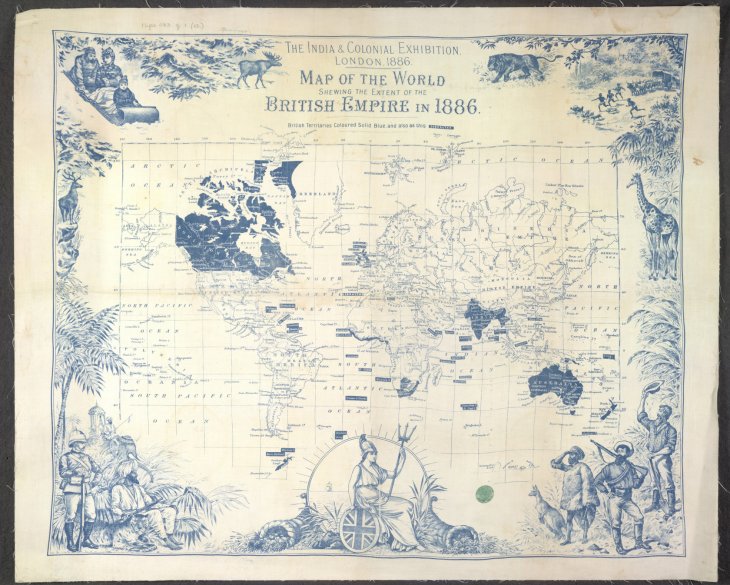
Map of the British Empire from the India & Colonial Exhibition in London, 1886. PHOTO: The British Library
When we discuss decolonising the academy, we are talking about power, and more specifically power hierarchies. So, we are discussing unevenly distributed power when it comes to defining knowledge, which inevitably leads to skewed knowledge, to incomplete knowledge.
This Week in South Sudan – Week 23
Tuesday 5 June A former information minister in Western Bahr el Ghazal, Omer Eshag Mohamed, announced his decision to join the opposition movement led by General Paul Malong. Foreign Policy: “Conflict in Abyei Could Reignite South Sudan’s Civil War” Thursday 7 June The Government of South Sudan and the Government of Sudan agreed to repair… Read more »
Decolonize Academia!
Today the Peace Research Institute Oslo (PRIO) is holding a seminar titled Decolonizing the Academy.
Our aim is for this seminar to start a national discussion about the legacy of the colonial era in Norwegian academia – both in relation to its formal structures and the ways in which we as researchers conceptualize and categorize the world.
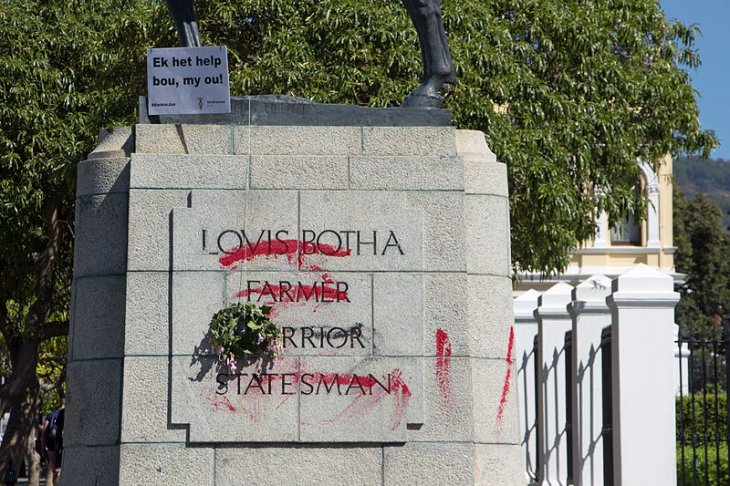
Defaced statue of Louis Botha outside the Houses of Parliament in Cape Town during the Rhodes Must Fall campaign. The wreaths were placed on the defaced statue by members of AfriForum. The AfriForum sign says Ek het help bou, ou! (“I helped build, friend!”) and #dankieJan (“#thanksJan”). Photo: Wikimedia Commons
The debate about the need to decolonize academia has raged internationally for several years. Student movements at the University of Cape Town and the University of Oxford, under the hashtag #RhodesMustFall, have used their demands for the removal of statues of the colonialist Cecil Rhodes from campuses as the pivot for a comprehensive critique of structural inequality and racism in the university system. A formal launch of this discussion in Norway is of the utmost necessity, and is already long overdue.
The Long Peace Most Likely Began during the Vietnam War
Two statisticians at the University of Oslo have blown a hole in Steven Pinker’s famous theory that the Long Peace dates from 1945 onwards. But Pinker is excited about the new calculations, which suggest that this more peaceful period instead began in 1965 – during the Vietnam War.
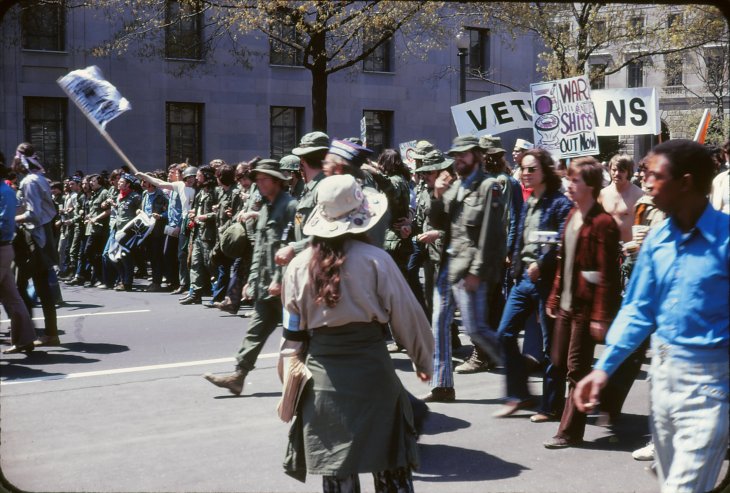
Washington 1971: The demonstrations against the Vietnam war may have made it more difficult to go to war. Foto: Leena A. Krohn / Wikimedia Commons / CC BY-SA 3.0
In his 2011 book, The Better Angels of Our Nature, the internationally famous psychologist and popular-science author Steven Pinker looks at history over several millennia and observes that the world has become gradually more peaceful. He has also described the period since World War II as “the Long Peace”, due to the decline in the number of interstate wars. But now Pinker seems to be having second thoughts, after reading a blog post written on January 15 by Professor Nils Lid Hjort of the Department of Mathematics at the University of Oslo (UiO), following a seminar at the Peace Research Institute Oslo (PRIO).Read More
This Week in South Sudan – Week 22
Monday 28 May The Kenyan opposition leader, and the country’s special envoy to South Sudan, Raila Odinga, met with President Salva Kiir to discuss ways of resolving the civil war. Odinga is also scheduled to travel to South Africa to meet the former first vice-president Riek Machar. The South Sudan United Front/Army (SSUF/A) has returned… Read more »
I Am a Friend of Israel. And I Can’t Accept Its Indiscriminate Violence Against Palestinians in Gaza
The political leadership in Israel often uses the concept of “friend” and “enemy.” Other countries also use those concepts from time to time, but it seems that they are particularly prevalent in Israeli political language. For instance, Prime Minister Netanyahu talks of “true friend” Donald Trump, “close friend” Narendra Modi of India, while other leaders and nations may be more difficult to place on his friendship scale. Israel is a country I have engaged with professionally and personally for many years, and something I will continue to do. I consider myself a friend of Israel, but that raises the question: what does that mean?
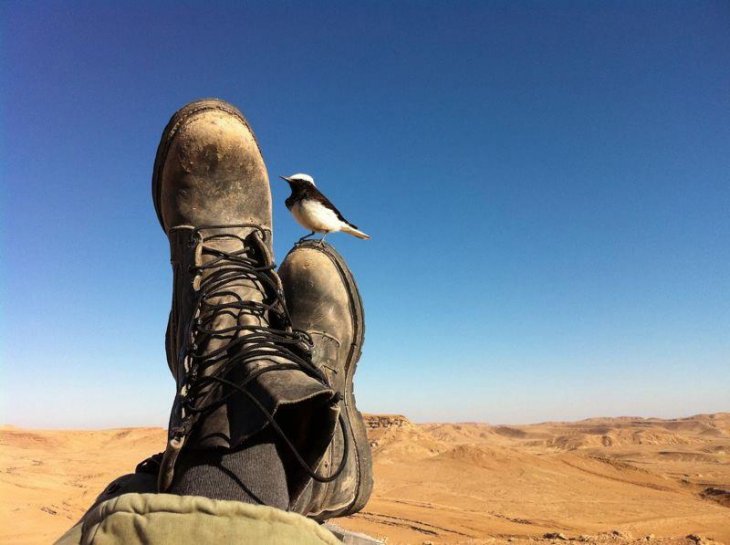
A soldier from the Golani Brigade relaxes in the desert. PHOTO: Creative Commons/IDF
Since the end of March thousands of Palestinians in Gaza have taken part in demonstrations along the border with Israel. The Israeli military response has resulted in many deaths and many more serious injuries among the protesters. The protests are continuing.
Food Insecurity and Unrest
Food price fluctuations over the last decade and the corresponding unrest in several countries in Asia, Africa and the Middle East have led to a renewed interest in the link between food and unrest. A recent policy brief highlights some of the main findings in the field and suggests avenues for future research related to… Read more »
Norway – The Colonial Power
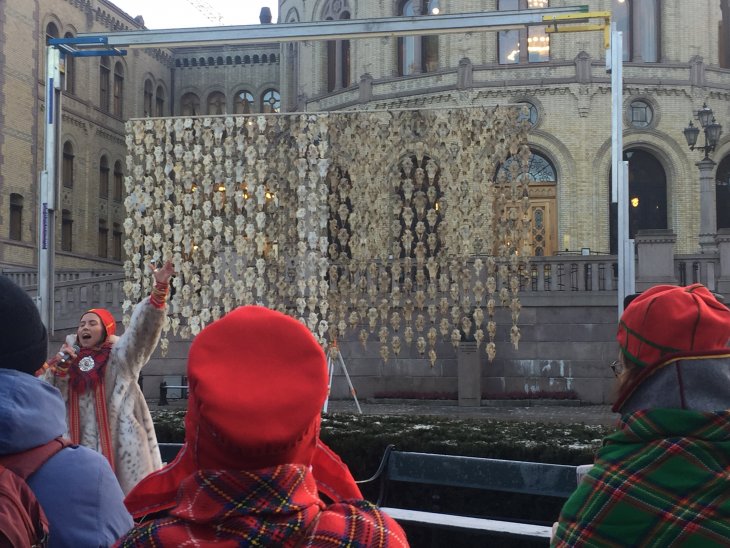
Protest outside Norwegian parliament to mark support for reindeer herder, Jovsset Ánte Sara. Photo: Wikimedia Commons
Imagine this. Close to a small lake, there is a little building. It has stood there for 120 years – ever since your ancestors, who lived off fishing and foraging, built it. Your grandmother brings you to this place to pass your people’s traditions on to you. You go there in order to preserve knowledge, language, and cultural practices that have been passed down through generations, and that are at risk of being lost. Then one day, the state decides that this little, but important, building is built illegally. They set it on fire, and you have to see it burn to the ground.